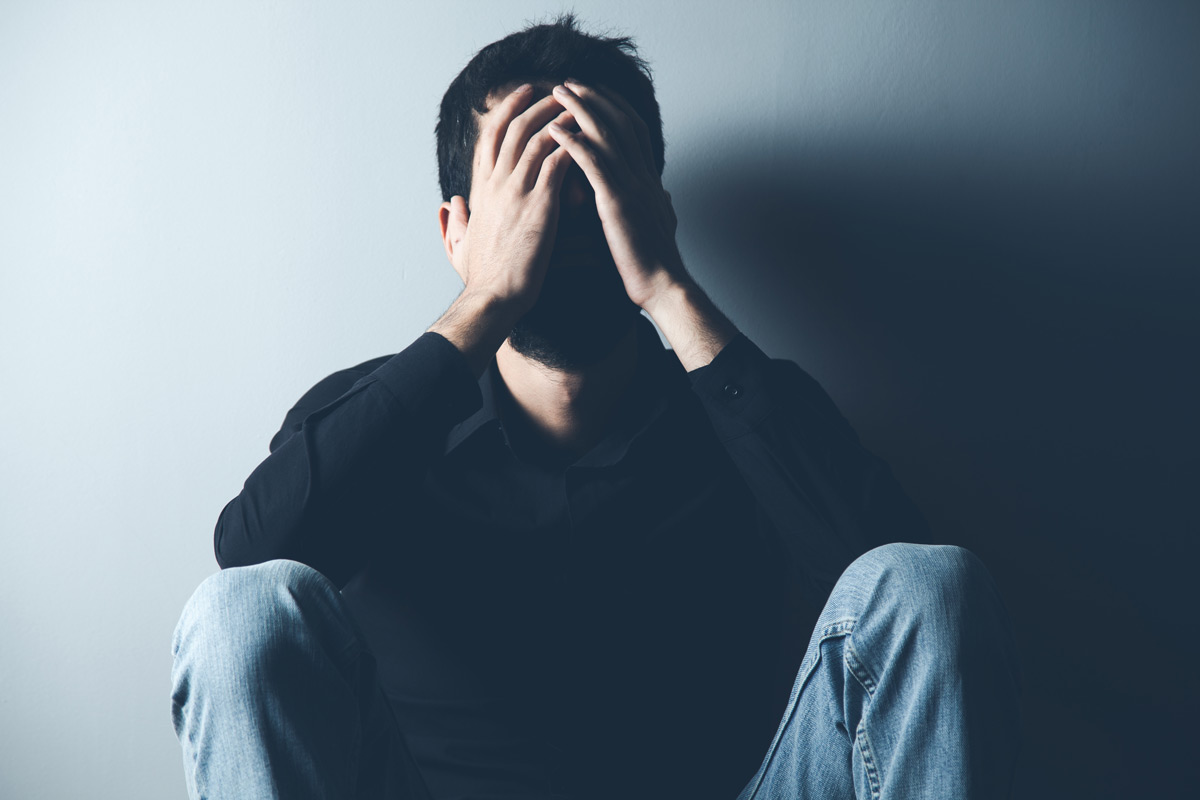How To Know If You are Depressed( Best Guide)

How To Know If You’re Depressed: Depression can be a transient problem or a chronic disorder that persists for many years. Even if you’ve just suffered a loss or are going through a difficult moment in your life, it’s perfectly natural to occasionally feel depressed, lonely, or hopeless. However, these common emotions of melancholy can develop into more serious ones. Do not be reluctant to ask a medical expert for assistance if you suspect that you may be depressed. Enough Info

Being unhappy is different from being depressed. The word “depression” is frequently used in an ambiguous way to refer to how we feel during a breakup or after a difficult work week. However, major depressive disorder, a form of depression, is a lot trickier. There are specific signs that distinguish depression from the occasional sadness we all experience in life.
Read Also; 22 Fast Home Remedies to Get Rid of a Cough
How To Know If You’re Depressed:
1. Negative Prognosis
A mood illness known as major depression impacts your attitude toward life in general. The most typical sign of depression is having a powerless or dismal attitude toward life. Other emotions could include inadequacy, self-loathing, or unwarranted guilt. It’s all my fault” or “What’s the purpose” are two typical, recurrent ideas associated with depression.
2. Lacking interest
The happiness or pleasure of the things you love might be diminished by depression. Another telltale indicator of serious depression is a lack of interest in or withdrawal from formerly enjoyable activities like sports, hobbies, or hanging out with friends. Sex is another topic in which you could lose interest. The loss of sexual desire and even impotence are signs of serious depression.
3. Increased weariness and difficulty sleeping
You may quit doing things you like because you feel too exhausted in part. One of the most incapacitating symptoms of depression is extreme exhaustion, which is frequently accompanied by a lack of energy. This could result in oversleeping. Insomnia and depression are related since one condition can cause the other and vice versa. They might worsen one another as well. Anxiety might also result from a lack of restful sleep.
4. Increased weariness and difficulty sleeping
Although it hasn’t been demonstrated that anxiety causes depression, the two diseases frequently coexist. Anxiety symptoms might include: How to Become a Professional Footballer (9 Simple Steps)
- Anxiousness, agitation, or a sense of tension
- Sensations of dread, fear, or danger
- Quick heartbeat
- Quickly breathing
- Increased or profuse perspiration
- Muscular trembling or twitching
- Difficulty paying attention to or thinking effectively about anything but the issue you’re worried about
5. Irritability in men
The effects of depression vary between the sexes. According to research, males who are depressed may exhibit signs including impatience, hazardous or escapist behavior, substance addiction, or inappropriate aggression. In comparison to women, males are also less likely to notice depression or seek therapy for it.
6. Changes in appetite and weight
Depression patients may have changes in their weight and appetite. Each person’s experience with this can be unique. While some people will gain weight due to increased hunger, others will see weight loss.
Whether dietary changes are purposeful or unintentional can help determine whether they are connected to depression. If they aren’t, depression may be the root of them.
7. Uncontrollable emotions
It’s an angry outburst for a moment. You suddenly start sobbing uncontrollably. The shift was not caused by anything outside of you, yet your feelings might alter at any time. Mood fluctuations may result from depression. Remember that depression is a collection of unfavorable thoughts and sensations that accumulates over time rather than a single emotion. Depression may create various physical changes in your body, which is entirely natural. Consider your actions over the previous few weeks to assess whether or not you are feeling depressed. How to have a good singing voice (Top 14 Tips)
- Emotional changes, such as hopelessness, increased irritability, and thoughts of self-loathing, are typical indicators of depression.
- Physical symptoms of depression include decreased appetite, a desire to sleep more or not at all, poor energy, trouble concentrating, and sporadic headaches, stomach aches, and muscular aches.
- Depression may cause changes to your regular routine. For instance, you might not find many activities to be engaging or you might partake in riskier hobbies like drug usage or gambling.
Read Also; How To Tell If You Have An Ear Infection
8. Looking at death
Suicide and depression can sometimes go hand in hand. According to the Centers for Disease Control and Prevention-Trusted Source, more than 42,000 persons in the United States committed themselves in 2013.
Suicidal deaths frequently start with symptoms. Before really succeeding in taking their own lives, people frequently discuss it or make the first attempt. If you believe someone is immediately at danger of harming himself or another person:
- Dial your local emergency number or 911.
- Keep the individual close until assistance comes.
- Take away any weapons, knives, prescription drugs, or other anything that might be harmful.
- Listen without judging, disputing, threatening, or yelling.
9. Getting help
You may have severe depressive disorder if you’ve had some of the aforementioned symptoms for longer than two weeks. In order to receive the proper care, you must first acknowledge that you are sad.
There are many different therapies for depression, ranging from lifestyle adjustments to pharmaceuticals, which impact millions of individuals. The first step to feeling like yourself again, regardless of the course of treatment you select, is to ask for help from a specialist. How to use OLAPLEX( Step and Requirement)
Read Also; How To Make Quesadilla ( Step by Step Methods)
Identifying changes in behavior
1. Check your weight periodically to see if there are any extreme changes
Keeping in mind that depression can have a significant impact on your general appetite, weight gain or loss can be side effects of depression. Be careful to discuss this with your doctor if you’ve observed a substantial change in your appetite, whether it’s risen or decreased.
Weight gain or loss may not only be a sign of depression; it can also be caused by a number of other factors.
2. Write a list of any changes in behavior that you’ve had
Think back over the last few weeks and how you behaved. Dangerous or risk-taking behavior is a more active symptom of depression, despite the fact that it can appear in many different forms. Have you tried drugs, gambled, or engaged in other extreme sports or hobbies that could have serious repercussions? These are some examples of dangerous activity.
3. Count how many times you’ve cried in the past week
Consider how often you’ve felt emotional recently and the circumstances that set you off. There’s a considerable probability that you may have depression if you frequently find yourself crying about unimportant, unimportant things.
- For instance, it’s a good sign that you might be depressed if you start crying uncontrollably or for unimportant things like dropping a cup of water or missing your bus.
- Teenage depression is frequently characterized by tearfulness or excessive crying.
4. Reflect on any mysterious aches and pains you have had
Count the number of random pains you experienced this past week, such as stomachaches, headaches, and stomachaches without a known cause. The cause of your pain may be a medical condition, but it’s also possible that depression is to blame.
- One of the more prevalent and frequently disregarded symptoms of depression in men is physical pain. Tell your doctor right away if you’re a man experiencing any physical symptoms, such as backaches, headaches, stomach issues, sexual dysfunction, or anything else.
- Since physical issues are more frequently mentioned by elderly people than mental or emotional ones, depression may go unnoticed for a very long time. Keep an eye out for any physical changes, friend deaths, and loss of independence that might lead to depression.

How To Know If You’re Depressed:
Searching for the Root of Your Depression
1. Evaluate past events that might be the cause of your depression
Consider a tragic experience from your history, such as the loss of a loved one or an abusive relationship, that may have pushed you over the edge. Consider how you felt before and after these incidents to determine if they might have contributed to your depression.
- For instance, the deaths of two family members within a short period of time apart could be the root of your despair.
- It’s also possible that a stressful event in your life, such as a negative relationship outcome, a difficult medical diagnosis, or financial difficulties, is to blame.
2. Note that postpartum depression can occur after you give birth
Consider when your depressed symptoms started if you recently had a child. Remember that mood swings, irritability, and other symptoms are common in new mothers and can range from slight to severe. You might have postpartum depression if your symptoms started soon after giving birth or within the next few months.
- The “baby blues” symptoms are typically temporary for new mothers, and they go away on their own. This is presumably brought on by hormonal changes and postpartum stress.
- Consult a doctor right away if you experience suicidal thoughts, are unable to care for your child due to depression, or if your symptoms persist for more than a couple of weeks.
- A rare condition known as postpartum psychosis can appear two weeks after giving birth. Visit a hospital right away if your depression symptoms are severe and accompanied by wild mood swings, thoughts of hurting your child, or hallucinations.
3. Monitor your symptoms and see if they’re linked to the seasons
Consider the timing of your symptoms; if they begin to manifest as the days grow shorter and darker, you may be suffering from Seasonal Affective Disorder (SAD), which is brought on by inadequate sunlight. To check whether you get better, consider working out outside during the day. You can also try artificial light therapy. How to Stay Focused (Steps and Requirements)
- Not all transient depressions are caused by SAD. A lot of people experience depression episodes every few weeks, months, or even years.
4. Don’t dismiss your depression if none of these causes apply
It’s quite acceptable if you can’t tie your symptoms to a particular incident or period of time. Many depressive episodes have a primary biological, hormonal, or other difficult-to-define reason. This does not lessen how serious it is or how worthwhile treatment is. Keep in mind that depression is a legitimate medical disease for which there is no need to feel ashamed.
Read Also; How to do Crunches (Step-by-Step Guide 2023)
How To Know If You’re Depressed:
Seeking Treatment for Depression
1. Ask for support from your loved ones.
Inform your loved ones that you are struggling and that your capacity to live life to the fullest is being hampered by depression symptoms. Remember that your emotions of powerlessness are a symptom of your disease and not a reflection of reality and that solitude exacerbates them. Friends and family may assist you by listening to your issues, urging you to get medical attention, and being there for you when things are at their worst.
- Let your friends know you’re depressed if you have problems getting out of the home or moving about, and urge them to keep inviting you to activities you like even if you can’t make it every time.
- The act of asking for assistance is not a sign of weakness.
2. Get a diagnosis from a medical professional
If you think you might have depression, make an appointment with a physician or psychiatrist. A medical expert can walk you through your symptoms and assist you in identifying the underlying cause of your condition. Remember that it is acceptable to get a second or even third opinion, especially if you feel that the doctor is not paying attention to what you are saying or is not focusing on the area that you believe is most essential.
- Make a list of your symptoms so a physician or psychiatrist can better understand how to assist you.
3. Attend therapy or counseling
So that you can meet with a person who will support you during recovery, and ask your doctor or psychiatrist for a reference or referral. Even thinking about group therapy or a support group is an option. Based on your symptoms, a medical expert may make a useful suggestion. How to do Crunches (Step-by-Step Guide 2023)
Read Also; How To Stop Drinking Alcohol ( Step- by Step
- For instance, if you have turned to drugs or alcohol as a coping mechanism, you could find a support group for depression or a group like Alcoholics Anonymous or Narcotics Anonymous to be beneficial.
4. Take an antidepressant medication to lower your symptoms
If you think taking medication would be a good choice, ask your doctor or therapist. Both depression and anxiety symptoms respond well to antidepressants. Remember that these drugs frequently take a week or two to start working, so you might not see a difference immediately away.
- Remember that taking medication on a long-term basis is not recommended. It can ease your symptoms, but to see a noticeable difference you will probably also need to seek out other treatments, such as counseling.
5. Cultivate good relationships
Keep in touch with your pals frequently and keep them close. When you need someone to talk to, it is extremely critical that you do so among your friends and family. Just talking to someone about how you are feeling could make you feel better.
- Try joining a group of people who share your interests or perhaps a group you’d never considered previously if you want to make some new pals. It may be simpler to form a habit of attending a regular event, such as a weekly dance party or reading club.
- In order to strike up a conversation with someone you don’t know at one of these gatherings, all it takes is a smile and eye contact. If you have a lot of anxiety about it, look for a smaller group or one with folks you feel more at ease around.
6. Exercise on a regular basis
Spend a few minutes every day doing something that truly gets your heart rate up, whether it’s jogging, power walking, or anything else. Increase your endurance daily because exercise is a terrific method to feel better on the inside.
- You may try something easy, like dancing to music in your room or walking your dog.
- You can always exercise in a park or a gym for a change of environment.
Conclusion:
Depression is a prevalent illness worldwide, affecting an estimated 3.8% of the population, including 5% of adults and 5.7% of adults over 60 years of age (1). Approximately 280 million individuals worldwide suffer from depression (1). Depression is distinct from normal mood swings and fleeting emotional responses to everyday challenges.
Read Also: How To Deal With Anxiety(2023)




